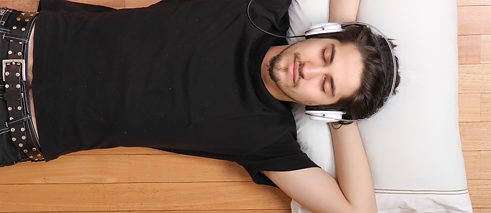Conscious listening
Savouring music

There is often too much of everything in today's consumerist world. And that includes music. It is possible for us to consume music anywhere at any time. But that is not the same as listening to it. Now, there are initiatives aimed at helping us learn the art of conscious listening.
How can we rediscover classical music? Gebhard von Gültlingen has an answer. He is the head of Musicosophia, a very special school operating in a small Black Forest village in Germany. He and his staff seek to help musicians, teachers and music lovers master the technique of conscious listening. The Musicosophia method is a method of listening developed specially for the musical layman: the school offers seminars for music lovers but also helps technically proficient professional musicians develop a feel for their listeners' emotions. Von Gütlingen believes "music has the answers to the big issues, joy, happiness and love". But because we frequently experience music as just background sound and don't really listen to it, we often fail to get the messages.
Most of us today are just passive listeners
According to a Hamburg University study on the future of music use, an overwhelming majority of people today listen to music only passively, often streaming it on a smart phone or laptop while engaging in other activities such as work or sport. Nearly a third of respondents told the survey team they only listen to music consciously when they are driving. And only a small minority would think of settling down in a comfortable armchair with a glass of wine to concentrate on a piece of music. So there is ample scope and cause for Musicosophia staff and others to encourage a return to conscious musical experience.
In 2005, a No Music Day was introduced. It is observed on 21st November each year. The brainchild of British musician and conceptual artist Bill Drummond, its manifesto announces that "no hymns will be sung, no records will be played on the radio". The theory is that spending a whole day without music will focus people's minds on what they want from music – that sometimes the only way to make us realise how much something means to us is to take it away. In late 2018, the German edition of Rolling Stone Magazine ventured a prediction: "Maybe music will change the world again one day if we go back to listening to it more consciously".
That is also the hope of Munich-based musician and arts event organiser Federico Sánchez, who has created a new performance format. "The basic idea was to present music like a film," he recalls. The result was a series of "Hearings". In October 2016, Sánchez started organising events at irregular intervals and different locations to present new albums by artists in the Munich music scene. In most cases, the events were a pre-launch premiere, featuring a full-length performance of the album followed by an audience Q&A session with the musicians. "It's about maintaining the coherence of the album," he explains, pointing out that radio stations generally play only individual tracks and fail to convey the overall character of the work.
Optimised acoustic environments
A special role is played by complex modern music – what is known as New Music or contemporary classical music – which breaks with conventional harmonies and structures and thus does not lend itself to quick consumption or as background music. Many people find it inaccessible. The director of the Mecklenburg-Vorpommern Music Festival, Markus Fein, was invited by the Körber Foundation to develop a format specifically for this kind of music. Called "2 x hören" ("Hear Twice"), it features two live performances of the same classical piece, one before and one after a discussion with the musicians. The idea is to eliminate reservations about contemporary classical music. The format has now been adopted by a whole range of German and international concert halls, including the Berliner Konzerthaus and Mozarteum Salzburg. It is an invitation for audiences to rely once again on their own ears.
Mitteldeutsche HIFI-Tage, a music hardware trade fair in Leipzig, focuses mainly on the technical aspects of conscious musical enjoyment. First staged in November 2017, it is an annual event that trains a spotlight on solutions for the best possible reproduction of music – optimised systems for high-quality sound. The trade fair is naturally driven by the commercial interests of manufacturers but it can also be seen as active support for conscious listening – promotion of high-quality musical enjoyment instead of the ubiquitous mass consumption of compressed-quality sound.
One final sign of a growing interest in conscious musical enjoyment is seen in the development of vinyl record sales, which rocketed from eight million LPs in 2007 to 74 million in 2017. That is a staggering surge considering that vinyl was declared dead back in the late 1990s. Anyone who takes the time to put an LP on a turntable, remove any dust from it, clean the stylus with a fine brush, carefully lower the tone arm at the right point – and go through the entire procedure again 30 minutes later – is also prepared to pay full attention to the music. The same goes for concert‑goers, for whom a concert is generally a long-awaited treat.